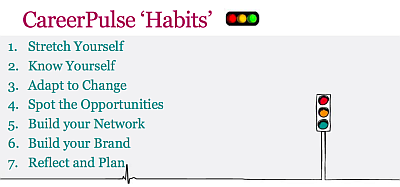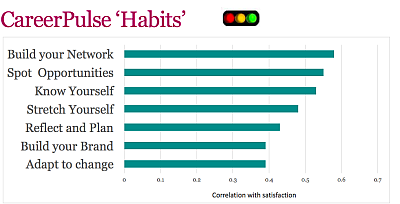“The need for dynamic, globally-equipped, adaptive employees has become increasingly necessary to the success of organisations. Whilst employees want to develop their careers, they may lack the career management skills to do so and look to their employer for support. Better clarity is needed to understand the career management skills and practices that people can develop to navigate this reality.” Nathan Iverson
Research has shown a relationship between proactive career management skills and satisfaction with your career.
Key Points:
- Seven career development practices (detailed below) are clearly associated with career satisfaction.
- Build your network was the most important practice for career satisfaction, followed by Spot the opportunities and then Know yourself.
- Organisational career support provided benefits to individuals over and above their own career management skills.
- Organisational career support was most closely related to career satisfaction and also compensated for lower individual scores on the career development practices.
In 2011 we developed a unique diagnostic tool, the Career Pulse, which focuses on the skills, attitudes and behaviours that enable individuals to improve their career health. The diagnostic provides individuals with personalised feedback on seven career development practices – what we often refer to as ‘career health habits’- and how they can be enhanced. This insight helps individuals and organisations to focus on the changes that make a difference to career development, career satisfaction and career agility.
Research by Nathan Iverson, published in the NICEC journal in October 2016, used Career Pulse data to compare 2870 individuals across 40 nations. He measured the relationship between the seven career development practices and career satisfaction. Career satisfaction included financial rewards, meaning and purpose at work, growth opportunities and work/life balance.
The seven career development practices are:
The Outcomes
All seven career development practices were found to be associated with career satisfaction.
- Build your network (plan a strong and diverse network of relationships to underpin your career goals) – emerged as the most important practice for career satisfaction.
- Spot the opportunities (navigate a changing industry, identifying new career opportunities and the skills required) – was the second most important practice.
- Know yourself (understand what you enjoy, and do well, through reflection and feedback-seeking) – was the third most important practice linked to career satisfaction.
The study also explored the career support that organisations provided.
- Organisational career support provided benefits to individuals over and above their own career management skills.
- Organisational support was most closely related to career satisfaction and also compensated for lower individual scores on the career development practices.
The research concluded that:
- People and organisations can develop career management skills to successfully navigate the changing work environment.
- Investing in these skills is closely linked to satisfaction with your career.
- Organisations have a key role in providing the support and conditions for employees to grow and utilise career management skills.
“Individuals can proactively drive their careers by learning and adopting career development practices that are related to their career satisfaction, but organisations also have an important role to play in nurturing career satisfaction.”
Nathan Iverson
Find out about the seven career health habits and the Career Pulse tool.
Read the full research article, reproduced courtesy of NICEC.







